Rabbit Hole, Kate Brody
Kate Brody’s debut novel, Rabbit Hole, is an unflinching exploration of grief, family and true crime, which will have you gripped in a chokehold until the final page.
Teddy Angstrom is no stranger to tragedy. From the novel’s exposition, we learn that her father has committed suicide on the tenth-year anniversary of her sister Angie’s disappearance. In the aftermath of her father’s death, Teddy uncovers the troubling digital footprint he has left behind. After discovering her father’s obsessive presence on Reddit threads that discuss Angie’s disappearance, she takes it upon herself to keep digging into her sister’s case. Burrowing deeper and deeper into the ‘rabbit hole’ of the online true crime community, she meets Mickey, a 19-year-old girl, with whom Teddy soon shares a toxic co-dependent relationship. Before long, Teddy’s job as an English teacher, her love life, and her sanity become threatened by her obsession with finding out what happened to Angie.
Fundamentally, Rabbit Hole is a novel about grief—specifically, what can happen if you let grief consume you entirely. The first person perspective immerses us in Teddy’s grief, and we watch how her sorrow seeps into every pore of her life. While this certainly makes for a claustrophobic read at times, the story resonated with me on a level I did not expect. The melancholy inherent in losing someone, and of being stripped of the opportunity to meet the person they will become, is a universal experience we can perhaps all relate to. While Teddy clings to Mickey as she represents a simulacrum of Angie when she went missing, a defining (and utterly heart-breaking) moment in the book manifests when Teddy realizes that Mickey will develop and grow in ways that Angie cannot. Brody masterfully conveys the void left by a person’s death or disappearance on those who loved them, and the lengths they will go to fill it.
Rabbit Hole plays with many of the themes permeating contemporary literary fiction through its exploration of obsession, true crime, and the way it employs the trope of the ‘messy’ female narrator. Yet it is unlike anything I have read. It’s deeply emotive—the grief within the pages is almost tangible—and disturbing in the way it illuminates the darkest recesses of the Internet. Despite the heavy subject matter, Brody manages to create a narrative which is affirming; while the novel begins with death, it ends with the potential for growth. In candidly depicting the raw, animalistic pain of grief, Brody actually conveys just how important it is to live.
Editorial Picks




